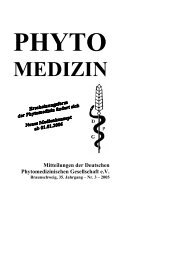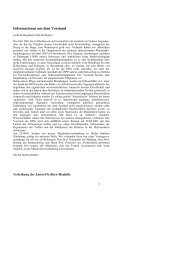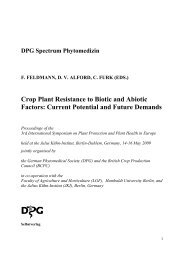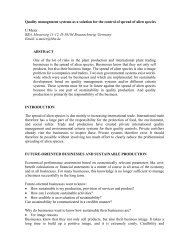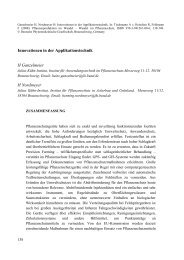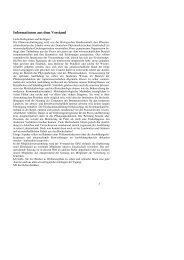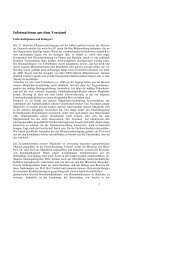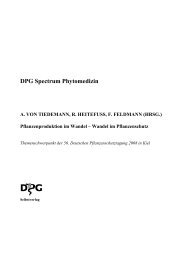Informationen aus dem Vorstand - Die DPG
Informationen aus dem Vorstand - Die DPG
Informationen aus dem Vorstand - Die DPG
Sie wollen auch ein ePaper? Erhöhen Sie die Reichweite Ihrer Titel.
YUMPU macht aus Druck-PDFs automatisch weboptimierte ePaper, die Google liebt.
esistenten Spinatsorten, jedoch wurde diese Resistenz immer wieder durchbrochen,<br />
so daß heute sieben Spinatmehltaurassen bekannt sind (Pf 1-Pf 7).<br />
Ziel eines laufenden Projektes am IGZ Großbeeren/Erfurt e. V. ist es daher ein<br />
Prognosemodell für Falschen Mehltau an Spinat zur Vorhersage des Auftretens und<br />
seiner Ausbreitung zu erstellen. <strong>Die</strong>ses Prognosemodell setzt sich <strong>aus</strong> drei<br />
Teilbereichen zusammen: Wachstumsmodell Spinat, Mikroklimamodell Spinat,<br />
Epi<strong>dem</strong>iologie des Erregers. Mit Hilfe dieses Prognosemodells soll eine gezieltere<br />
Bekämpfung des Erregers ermöglicht werden.<br />
Studies on insects as vectors of bacterial diseases of cowpea and cassava, with<br />
special emphasis on the variegated grasshopper Zonocerus variegatus<br />
Zandjanakou, M. 1,2 , Wydra, K. 1,2 , Borgemeister, C. 1 , LeGall, P. 2 ; 1 Institut für<br />
Pflanzenkrankheiten und Pflanzenschutz, Universität Hannover, Germany;<br />
2 International Institute of Tropical Agriculture (IITA), Cotonou, Benin.<br />
As contribution to the discussion during the meeting on modes of transmission of<br />
bacterial diseases, results of studies on the dissemination of bacterial pathogens by<br />
insect vectors were presented. Although these studies concerned tropical plant<br />
diseases, general aspects of the results may well be valid bacterial diseases in<br />
temperate regions and under glasshouse conditions for the transmission of.<br />
Xanthomonas campestris pv. manihotis (Xcm) and X.c. pv. vignicola (Xcv) c<strong>aus</strong>e<br />
cassava bacterial blight (CBB) and cowpea bacterial blight (CoBB), respectively,<br />
which are important diseases in cassava and cowpea growing regions worldwide.<br />
Epi<strong>dem</strong>iological studies on the possible propagation of the diseases by insect vectors<br />
were conducted.<br />
Transmission of Xcm by Z. variegatus: Xcm was detected on mandibles, legs, in<br />
intestines and in high number in faeces of insects collected in cassava fields.<br />
Incidence of CBB in cassava plots attacked by Xcm-contaminated grasshoppers was<br />
44.4% compared to control plots with non-contaminated grasshoppers with 10.3% and<br />
grasshopper-free control plots with 18.2%. In glasshouse experiments, the disease was<br />
transmitted to healthy cassava leaves by Xcm-contaminated faeces.<br />
Survival of Xcm after passage through the insects: The number of Xcm in leaves fed to<br />
the insects and in faeces was quantified. Between 5.2x10 3 to 6.3x10 8 cfu/g were<br />
detected in faeces, compared to 1.3x10 9 cfu/g in fed leaves. It was <strong>dem</strong>onstrated that<br />
also low numbers of Xcm (e.g. an inoculum of 10 4 cfu/ml sprayed on leaves) are<br />
sufficient for the infection of cassava plants under favourable conditions.<br />
Transmission of Xcv by insects: All eight insect species except one species<br />
collected in bacterial blight-infected cowpea fields carried Xcv An epiphytic Xcv<br />
population of up to 8.9x10 4 cfu/g leaf was detected on cowpea leaves after<br />
transferring Xcv-contaminated Z. variegatus from infected to the healthy leaves. This<br />
number of bacteria is sufficient for infection, since cowpea plants superficially<br />
sprayed by a suspension of 10 4 cfu/ml of Xcv developed typical symptoms.<br />
Conclusions: Insects moving and/or feeding in cowpea fields and grasshoppers in<br />
cassava fields are potential vectors of cowpea and cassava bacterial blight,<br />
respectively, and can contribute to the dissemination of the diseases.<br />
26




